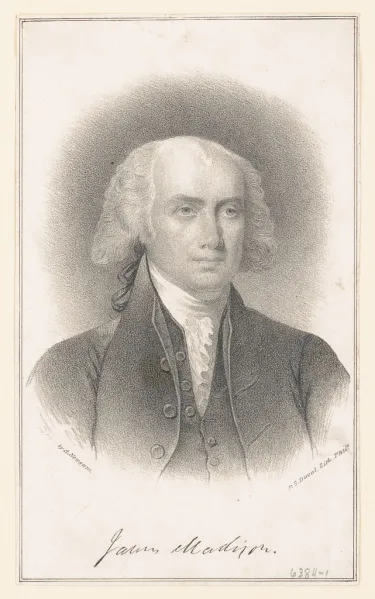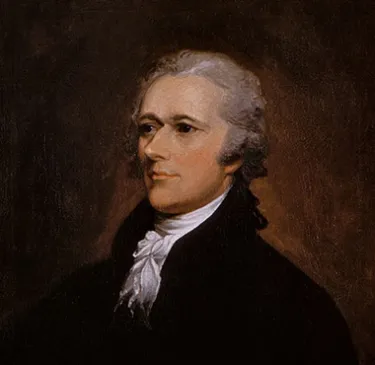Compromise of 1790

Leading up to the Compromise of 1790, two important topics were debated in Congress with such ferocity that both issues had halted in a congressional deadlock. The two contested issues were the following: first, the argument over the location of the permanent residency of the United States capital and second, the solution for the debt incurred from the American Revolution.
By 1790, the capital of the Nation had been temporarily located in Philadelphia for a decade. While solidifying the strength of the new nation, the American public desired a permanent location for the country’s capital. However, when it came down to deciding the permanent location of the capital, a rift formed between the North and the South. Southerners, especially Virginians, including James Madison, wanted the capital to be in the South, between Virginia and Maryland, on the banks of the Potomac River. Northerners contested this proposition because they did not want their capital to be located between two slave states. If the capital resided between two slave states, Northerners feared it would suggest that the North did not contest the institution of slavery. For Southerners, the primary reasons for the capital residing on the Potomac River was centered around the idea of creating a center of commerce near them and retaining influence over their states.
The other divisive issue contested in Congress, and arguably the more important one, was the problem of national debt and the question of assumption. After the American Revolution, every state had accrued substantial debts— an estimated total of about $25 million. In 1789, the House of Representatives called on Alexander Hamilton, the Secretary of the Treasury, to devise a solution for the issue of debt and a plan for the support of public credit for the United States. Hamilton was a federalist and believed that power should reside in a central authority – that being the federal government. Hamilton argued that the federal treasury should create a system in which the government would become responsible for the debts of individual states.
In his Report on Public Credit, he wanted to combine all the debts of the states into one public debt. In this system, he would establish a public credit system by which debts were paid off through national taxes. Hamilton’s system called for the issuing of treasury bonds to those in the public who were willing to purchase them, namely the wealthy. The purchase of these bonds then gave the buyer a stake in the national government, and in turn, the government would pay off the bonds with interest from the revenue from public taxation. Hamilton believed that this would bind the wealthy in a group whose prosperity was directly tied to that of the government, making them ardent supporters of governmental success.

Hamilton argued that his system would also create a fiscally strong federal government. Northerners tended to support this idea of debt assumption because many of their debts were unpaid whereas the majority of Southerners, including Virginian James Madison, ardently opposed assumption for multiple reasons. Firstly, many Southern states were already in the process of paying off their war debts and some, namely Virginia, had nearly paid off their debts in full. These states did not want to pay taxes to subsidize the debts of other states who had not yet begun to pay. Secondly, Madison despised the fact that most of the wealthy who were bondholders had purchased bonds from previous owners. After the war, many veterans and the poor were selling their debt shares for significantly reduced rates to the wealthy. Madison did not want to discriminate between primary and secondary holders of the bonds, by rewarding the wealthy instead of the poor. By giving more power to the government and the wealthy, most Southerners feared that this system of assumption was anti-democratic and would result in the power of the corrupt elite.
Hamilton’s assumption bill had already failed twice in congress, after he had initially introduced it in January 1790. There was also little movement towards agreeing on a capital location. There were no obvious common threads between the issues of the location of the capital and the question of debt assumption; however, they became intertwined because both issues resulted in a firm divide mainly between the North and South, and each side wanted to advance their own interest such that there was an opportunity to negotiate.
To find a solution to these two issues, multiple unofficial meetings were called between politicians, some secret, others held publicly. One of these meetings was held by Thomas Jefferson, who invited James Madison and Alexander Hamilton to a private dinner to seek a compromise for the issues at stake. Hamilton was frustrated that the assumption bill was continually failing and called on Jefferson for his help and influence. Referred to as the “dinner table bargain,” this secret meeting took place on June 20, 1790. The three men negotiated a solution for both the capital and the assumption disputes.

In the “Dinner Table Bargain,” Madison agreed that when the issue of assumption was brought before Congress again, he would remain passive rather than actively opposing it, and would convince some of his fellow southern congressmen to support it. Hamilton, in turn, agreed that he would garner northern support for the Potomac River capital location and lower the rate at which Virginia would be taxed by $1.5 million under the assumption plan. As part of the Compromise of 1790, the Residence Act was passed in July 1790, establishing the U.S. capital in Washington, D.C. In exchange, The Funding Act, including the assumption act, passed in August 1790, and established Hamilton’s foundation for public credit.
Many historians express skepticism about the effect of the dinner party meeting on the eventual Compromise of 1790, and argue that the negotiations at the dinner table meeting did not aid the eventual passing of the Residence and Funding acts. There is some truth to this suggestion. Prior to the dinner table bargain, the Compromise of 1790 was already set in motion in a sense. Although Hamilton helped usher the capital issue through Congress smoothly, Madison had already gained the support that he needed to win the issue, and likely would have passed the residency act without Hamilton’s help. Despite the debate on how much the secret meeting influenced the resolution of the Residency Act, we do know that the dinner table bargain was crucial in lowering Virginia’s tax burden and establishing the public credit system.
Further Reading:
- George Washington Dealmaker-In-Chief: The Story of How The Father of Our Country Unleashed The Entrepreneurial Spirit in America By: Cyrus A. Ansary
- The Patriots: Alexander Hamilton, Thomas Jefferson, John Adams, and the Making of America By: Winston Groom
- First Principles: What America's Founders Learned from the Greeks and Romans and How That Shaped Our Country By: Thomas E. Ricks





